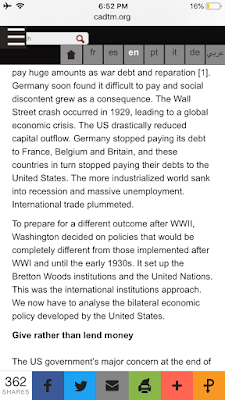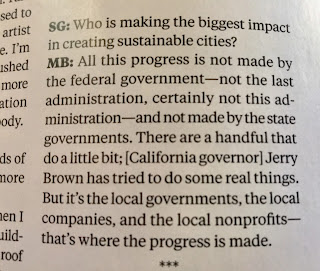Sadly, capitalism has become a dirty word in some circles, especially amongst young Westerners. I don't blame them. If my best-case prospect was 30,000 USD in debt (credit, car, and student loans) by the age of 24, I'd be against the system, too.
But capitalism isn't the problem per se--it's the way adults have engineered the economic system with lenient banks. Too many people fail to realize how much the U.S. dollar--or any empire's currency--has been propped up by military force and the slave trade.
Most young people do not know that England occupied Havana, Cuba in 1692 in part because of its strategic port; that Guantanamo Bay and Hong Kong are consequences of superpowers legally occupying weaker countries to perpetuate subservient relationships; that a treaty, Utrecht in 1713, specifically gave the British an exclusive license to take captured slaves to the Americas for sale and labor; that in the next phase of empire handover, Spain hastened its decline by supporting the English against France (choose your allies carefully, especially in wartime, when shifting allegiances are common); that the idea of absolute monarchy only crumbled in 1812 thanks to both French and American Revolutions; or that Mexican law (as of July 13, 1824, before America's 1863 Emancipation Proclamation) prohibited the slave trade; that the March 11, 1827 Constitution of Coahuila (Mexico) and Texas expressly declared, "in the [Mexican] state no one is born a slave"; that America invaded Nicaragua in 1912, Haiti in 1915, and the Dominican Republic in 1916 (because the Dominican Republic owed Wall Street money); and so on.
The American conquest of Mexican territory in 1848 is significant in that it created a playbook for Wall Street involvement: 1) create a pretext to invade; 2) take territory from the weaker country; and 3) force the country to go in debt in your currency.
This same playbook backfired severely in Germany when dominant powers imposed financial terms and conditions paving the way for demagogues, who always arrive with scapegoats in hand. (Ironically, it was a German philosopher, Immanuel Kant, who created a universal moral law in 1785 that should have assisted future German populations: "Act in such a way that you treat humanity, whether in your own person or in the person of another, always at the same time as an end and never simply as a means.") In those days, the world learned from its mistakes post-WWII, creating a Marshall Plan that led to defeated Germany and Japan becoming superpowers and stable trade partners. Today, no one believes Iraq--attacked and invaded twice by the United States--will ever become a superpower or more than an oil supplier.
Whither Western capitalism? Within historical context, it's hard to believe capitalism has ever worked an honest day in its life. To recapture the hearts and minds of young people all over the world, capitalism needs honest, sincere politicians, diplomats, and journalists. Currently, all of the aforementioned are MIA. Until that changes, we might as well prepare the obituary of capitalism--and our young.
© Matthew Mehdi Rafat
Bonus I: John Swinton, late 1800s:
I made the acquaintance of Wendell Phillips and found that he, too, had come to similar conclusions. He believed that the capitalist system was steadily undermining the world and bringing his countrymen into a condition quite as wretched as that of the slaves; and he vehemently condemned it.
Bonus II: Wendell Phillips (1861):
I think the first duty of society is justice.
The nation which, in moments when great moral questions disturb its peace, consults first for its own safety, is atheist and coward... Slavery has made our churches of Christ to churches of commerce.
Despotisms are cheap; free governments are a dear luxury--the machinery is complicated and expensive.
Were safety or security the first objective of human society, this principle, "if unlimited, false... [and] unqualified, it justifies every crime, and would have prevented every glory of history... But grant it. Suppose the Union means wealth, culture, happiness, and safety, man has no right to buy either by crime."
Look at our history. Under it, 700,000 slaves have increased to 4,000,000. We have paid $800,000,000 directly to the support of slavery. This secession will cost the Union and business $200,000,000 more. This loss which this disturbing force has brought to our trade and industry, within 60 years, it would be safe to call $500,000,000... slavery has been strong enough to rule the nation for sixty years, and now breaks it to pieces because it can rule no longer.
Bonus III: Alexander Hamilton: "Justice is the end [goal] of government. It is the end [goal] of civil society."
But capitalism isn't the problem per se--it's the way adults have engineered the economic system with lenient banks. Too many people fail to realize how much the U.S. dollar--or any empire's currency--has been propped up by military force and the slave trade.
 |
| The United States and Mexico, 1821-1848 ((c) 1913, 1969) by George Lockhart Rives |
 |
| Averell "Ace" Smith in Commonwealth Club Magazine (2019) |
 |
| Published by Colegio de Mexico |
 |
| Domino effect on debt non-repayment usually leads to a crisis. |
© Matthew Mehdi Rafat
Bonus I: John Swinton, late 1800s:
I made the acquaintance of Wendell Phillips and found that he, too, had come to similar conclusions. He believed that the capitalist system was steadily undermining the world and bringing his countrymen into a condition quite as wretched as that of the slaves; and he vehemently condemned it.
Bonus II: Wendell Phillips (1861):
I think the first duty of society is justice.
The nation which, in moments when great moral questions disturb its peace, consults first for its own safety, is atheist and coward... Slavery has made our churches of Christ to churches of commerce.
Despotisms are cheap; free governments are a dear luxury--the machinery is complicated and expensive.
Were safety or security the first objective of human society, this principle, "if unlimited, false... [and] unqualified, it justifies every crime, and would have prevented every glory of history... But grant it. Suppose the Union means wealth, culture, happiness, and safety, man has no right to buy either by crime."
Look at our history. Under it, 700,000 slaves have increased to 4,000,000. We have paid $800,000,000 directly to the support of slavery. This secession will cost the Union and business $200,000,000 more. This loss which this disturbing force has brought to our trade and industry, within 60 years, it would be safe to call $500,000,000... slavery has been strong enough to rule the nation for sixty years, and now breaks it to pieces because it can rule no longer.
Bonus III: Alexander Hamilton: "Justice is the end [goal] of government. It is the end [goal] of civil society."

